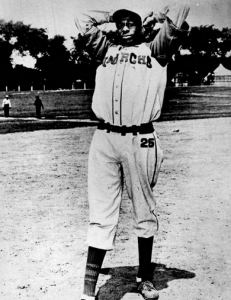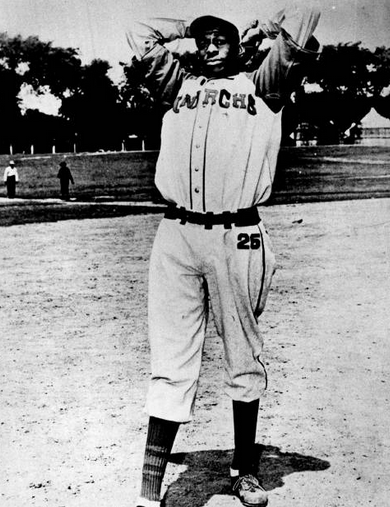August 1, 1943: Thrills and Surprises: 51,723 see Satchel Paige and other Negro League greats in All-Star Game
 “If you were anybody, you were at the East-West Game.” — Buck O’Neil
“If you were anybody, you were at the East-West Game.” — Buck O’Neil
“It was a great ball game,” wrote Wendell Smith of the Pittsburgh Courier. “One packed with thrills and surprises. One cast in a setting as colorful and picturesque as any movie saga. One that will go down in history in brilliant lettering and stand in bold relief until the pages upon which it is written wither in the dust of time.”1 Fortunately, digital archives have preserved for us the accounts of this game from August 1, 1943, or they could have indeed withered “in the dust of time.” While we are privileged to have technology that allows us to look back in time, we can never truly appreciate the significance of this game to the 51,723 who came to Comiskey Park to witness some of baseball’s all-time greats who were overlooked due to the color of their skin.
While the national pastime remained segregated, both the white major leagues and the Negro Leagues faced a common barrier as men of all races had donned or soon would don military uniforms to serve their country in World War II. But in a time of uncertainty, fans turned out in what amounted to the largest crowd in the history of the East-West Game. An estimated 10,000 more were turned away at the gates.2 Virgil Blueitt of Chicago was the home-plate umpire for the first four innings, and then he switched places with Fred McCrary of Philadelphia. Frank Forbes of New York City and Harry Walker of Cleveland completed the crew.
Satchel Paige of Kansas City started on the mound for the West, while David “Impo” Barnhill of the New York Cubans pitched for the East. Paige was already established as one of the all-time greats, but Barnhill, having the best season of his career to that point, wouldn’t let the huge crowd or the legend get to him. “When I walked out of the clubhouse and saw all those people, then I wanted to put on my big show,” said the man who learned the game playing stickball on the streets of Greenville, North Carolina. “That ain’t no time to be nervous.”3
Paige was dominant from the start, striking out Henry Kimbro of Baltimore and Buck Leonard of Homestead in the first inning. In the top of the second, Josh Gibson drew a walk; then with two out made it to second on a passed ball. But Paige struck out Sam Bankhead, also of Homestead, to end the threat.
In the bottom of the second, Neil Robinson of Memphis drew a walk from Barnhill. Buck O’Neil of Kansas City laid down a sacrifice bunt to get Robinson to second. Tommy Sampson of Birmingham singled to right, scoring Robinson and giving the West a 1-0 lead. Ted Radcliffe of Chicago lined into a double play to end the inning.
In the top of the third, Paige fanned Cool Papa Bell of Homestead to give him his fourth and final strikeout of the game. Surprisingly, with his pitching day completed, Paige still batted in the bottom of the inning. After looking overmatched with two Barnhill pitches, Paige laced a double to left, the only extra-base hit of the game until the ninth. Bubba Hyde of Memphis went in to run for Paige, who left to thunderous applause. “He left as he came — proud and cocky — still the most colorful player in baseball — still the ‘Great One,’” wrote Smith.4
Jesse Williams of Kansas City laid down a bunt that Barnhill fielded and threw to Homestead’s Howard Easterling at third. Easterling mistakenly thought it was a force play and failed to tag Hyde, which the official scorer later admitted should have been scored an error.5 No damage was done, as Hyde was later thrown out attempting to score on a fly ball.
In the fourth, the West padded its lead against pitcher John Wright of Homestead. Willard Brown of Kansas City singled to center and stole second. He moved to third on a groundout, and then scored when O’Neil grounded back to the mound. Wright threw to Leonard to get the out at first, but Leonard’s throw home was too late to get the sly Brown. The West held a 2-0 lead, but would score no more runs that day.
Gread McKinnis of Birmingham followed Paige and the lefty allowed only one hit, a single by Rabbit Martinez of New York, in three innings of work. Theolic Smith of Cleveland also pitched two hitless innings, but was mystified at trying to get that last out to finish the game. It was a nailbiting finish.
In the ninth, Smith was aided when Lloyd “Ducky” Davenport of Chicago robbed Bell of a hit to right field. Jerry Benjamin of Homestead pinch-hit for Juan “Tetelo” Vargas of the Cuban Stars. A slow roller to second was dug out at second by Tommy Sampson of Birmingham, who threw Benjamin out by a step. Next came Leonard, who drove the ball into Comiskey’s upper deck in right field (Wendell Smith reported the blast being 352 feet) to give the East its first run and make the score 2-1. Smith now had to contend with the ever-dangerous Gibson, batting .550 for the season. Gibson slammed a shot to Williams at shortstop, who “tried to field the ball and almost got his hand torn off,” wrote Frank Young of the Chicago Defender.6 The tying run was now on base. Easterling singled to right to move Gibson to second. West manager Frank Duncan had lost confidence in Smith and waved in Memphis’s Porter Moss from the bullpen. Vic Harris of Homestead, the manager of the East, countered by sending himself up to pinch-hit for Newark’s Leonard Pearson. Moss threw two poor pitches nowhere near the plate, and the intensity grew. He then threw a submarine-style pitch that got over for a strike. Harris popped a fly to Brown in center to end the contest. Young wrote, “that jam-packed session was a humdinger.”7
“This is not only the biggest Negro sports event,” wrote Joe Bostic of The People’s Voice, “but the largest proportion in the nation from the point of view of patron interest to the extent of paying an admission price. … No other event begins to draw anything like this one. … It is a great thing this classic, and I, for one, am proud to be a part of it.”8 Two years later, Bostic, an African-American sportswriter and pioneering radio broadcaster, escorted two Negro League players to the Brooklyn Dodgers’ spring camp and demanded of team President Branch Rickey that they receive a tryout. It was, perhaps, a poorly executed attempt at breaking baseball’s color barrier. It was Rickey himself who broke the barrier two years later with the signing of Jackie Robinson.9
Hope for racial equality on the baseball diamond was on the horizon. But even that day, as Wendell Smith concluded, “[O]nce again the sun is shining brilliantly on the baseball front in the rugged, Golden West!”10
Sources
Newspaper sources listed in the Notes are taken from:
Lester, Larry. Black Baseball’s National Showcase: The East-West All-Star Game, 1933-1953 (Lincoln, Nebraska: University of Nebraska Press, 2001).
Notes
1 Wendell Smith, “Pitchers Star as West Beats East in Thriller,” Pittsburgh Courier, August 7, 1943. Printed in Lester, 212.
2 United Press, “Satchel Paige Struts His Stuff in East-West Camp,” printed in Daily Notes (Canonsburg, Pennsylvania), August 2, 1943: 6.
3 James A. Riley, “Dave Barnhill,” 1981 SABR Baseball Research Journal. Retrieved September 4, 2017. sabr.org/journal/article/dave-barnhill
4 Smith. Lester, 213.
5 Frank Young, “Satchel Paige and West Take East Into Camp,” Chicago Defender, August 7, 1943. Lester, 217.
6 Ibid; Lester, 216.
7 Ibid.
8 Joe Bostic, “The East-West Classic, Top Sports Event,” The People’s Voice, August 14, 1943. Lester, 218-219.
9 George L. Hiss, The Joe Bostic Story: First Black American Radio Announcer. (Bloomington, Indiana: AuthorHouse, 2005), 72-73; Chris Lamb, “Two Who Tried Out Before Jackie Robinson,” Retrieved September 4, 2017. https://espn.com/mlb/story/_/id/12691678/two-tried-jackie-robinson. The players Bostic promoted to Rickey were Terris McDuffie and Dave “Showboat” Thomas, who were 35 and 40 years old, respectively, and were unlikely to have made the team anyway.
10 Smith. Lester, 214.
Additional Stats
Corrections? Additions?
If you can help us improve this game story, contact us.


